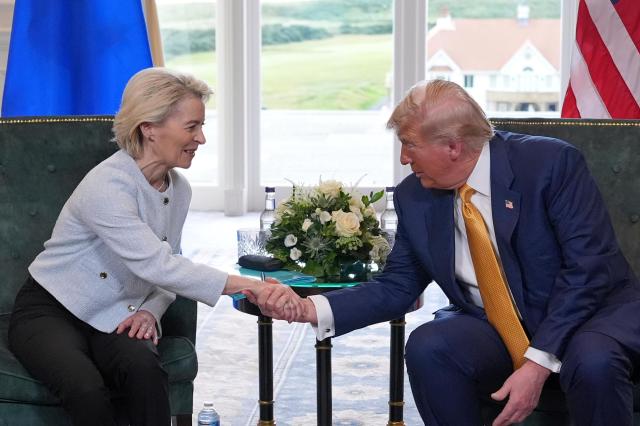US-EU Trade Negotiations: Trump's Tariff Brinkmanship Tests Trans-Atlantic Economic Relations
In a high-stakes meeting at Turnberry, Scotland, US President Donald Trump and European Commission President Ursula von der Leyen engage in crucial trade negotiations under the shadow of impending tariffs. The talks, potentially leading to the largest bilateral trade framework between the two powers, highlight growing tensions in trans-Atlantic economic relations.

US President Donald Trump and European Commission President Ursula von der Leyen during trade negotiations at Turnberry, Scotland
Critical Trade Summit Unfolds at Turnberry
In a significant diplomatic development, the United States and European Union have announced a new trade framework following intense negotiations between President Donald Trump and European Commission President Ursula von der Leyen at Trump's Scottish golf resort.
'It was a very interesting negotiation. I think it's going to be great for both parties,' Trump stated, though the specifics of the agreement remain carefully guarded.
Stakes and Implications
The talks come at a particularly sensitive moment for trans-Atlantic relations, with Trump's administration threatening to impose a substantial 30% tariff rate on European goods. This aggressive stance has raised concerns about potential economic disruption on both sides of the Atlantic.
The European Union, representing 27 member states and the world's largest trading bloc, has approached these negotiations with measured determination. Von der Leyen, demonstrating diplomatic finesse, acknowledged Trump's negotiating reputation while emphasising the unprecedented scale of potential cooperation.
Critical Points of Contention
- Minimum tariff rates, with Trump insisting on no less than 15%
- Trade deficit rebalancing between the US and EU
- Potential retaliatory measures from Europe if talks fail
- Implementation timeline and enforcement mechanisms
Global Economic Implications
The ramifications of these negotiations extend far beyond bilateral relations. A failure to reach agreement could trigger a cascade of economic consequences, affecting industries from French cheese producers to German electronics manufacturers.
Commerce Secretary Howard Lutnick's firm stance on the August 1st deadline adds particular urgency to the discussions. 'No extensions, no more grace periods,' he emphasised on Fox News Sunday, though noting that communication channels would remain open.
European Response Strategy
The EU has prepared a comprehensive response should talks fail, including targeted tariffs on American products ranging from beef to Boeing aircraft. This measured but firm approach demonstrates the bloc's commitment to protecting its economic interests while maintaining diplomatic dialogue.
Broader Context and Future Outlook
These negotiations occur against a backdrop of shifting global trade dynamics, including recent US agreements with Japan and Britain. The outcome could significantly influence the future of trans-Atlantic economic cooperation and the broader international trading system.
Thomas Reynolds
Correspondent for a London daily, specialist in British foreign policy and transatlantic issues.
